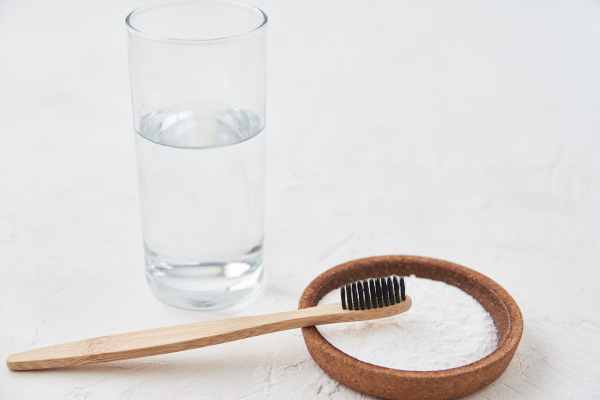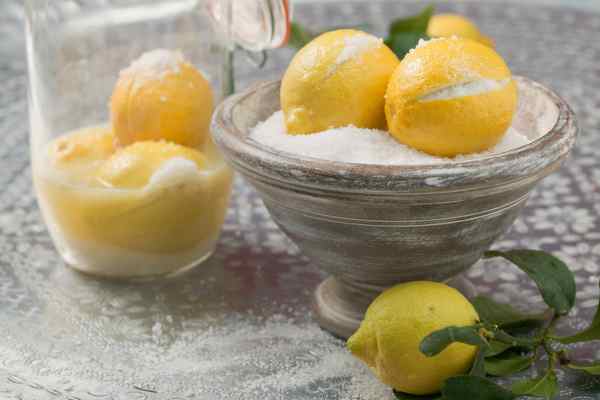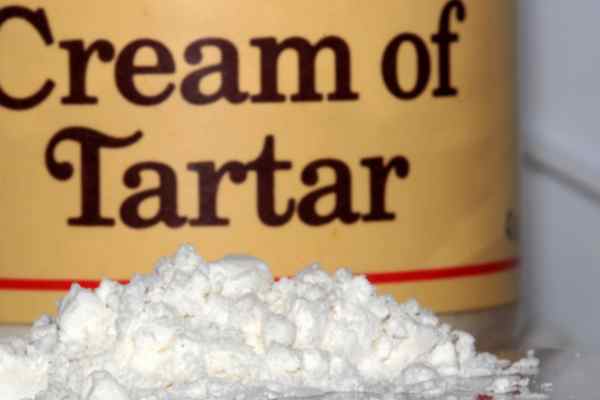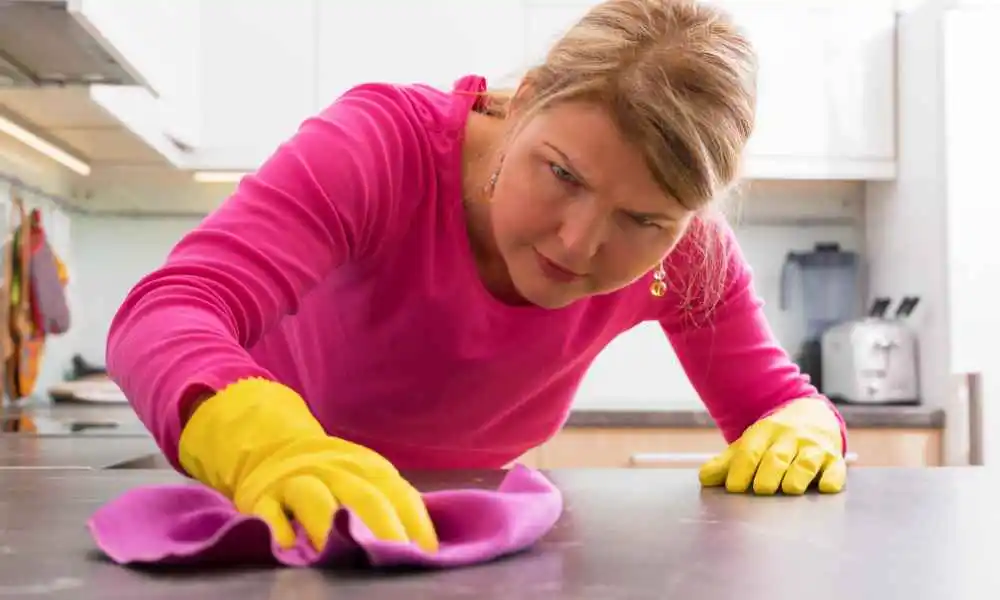Embarking on a journey to restore the pristine beauty of your countertops, we delve into the surprisingly common challenge of eradicating rust stains. These blemishes, often unexpected and always unwelcome, can surface from the simplest of oversights – a wet bottle left carelessly, a damp iron pan forgotten. Rust stains, those stubborn, unsightly marks, can arise from the simplest of oversights – a damp iron skillet left out just a bit too long, or a metal can that left its mark. But fear not, for your kitchen’s elegance and cleanliness are not lost causes. In this detailed guide, we’re diving into the world of countertop care, exploring safe and effective methods to remove rust stain from the countertop.
How do you remove brown stains from countertops?
To remove brown stains from countertops, start by mixing baking soda with water to create a paste. Apply the paste to the stained areas and let it sit for 15-20 minutes before scrubbing with a soft sponge or cloth. This gentle abrasive action should help lift the stains without damaging the countertop surface. Another method is to use a mixture of white vinegar and water. Spray the solution onto the stained areas and let it sit for a few minutes before wiping it away with a clean cloth. The acidity of the vinegar can help break down and remove the brown stains effectively.
Remember to always test these cleaning methods on a small, inconspicuous area of the countertop first to ensure they don’t cause any damage. Additionally, using cutting boards or coasters to prevent future stains can help maintain the cleanliness of your countertops.
Factor to Consider How To Remove Rust Stain From Countertop
Countertop Material
The type of material your countertop is made of is perhaps the most critical factor. Different materials have varying levels of resistance to abrasives and chemicals. For instance, natural stone like granite or marble can be sensitive to acidic cleaners like vinegar or lemon juice, while laminate or solid surface countertops might be more resilient. Always consider the material’s properties and susceptibility to damage before choosing a cleaning method.
Stain Severity
The severity of the rust stain can influence your approach. Light rust stains might only need a gentle cleaning method, like a baking soda paste or a vinegar soak. However, more stubborn or deeper stains might require stronger solutions like commercial rust removers or a pumice stone scrub. Assess the stain’s severity to determine the appropriate level of cleaning intensity needed.
Safety of Cleaning Agents
Consider the safety of the cleaning agents not just for your countertop, but also for your health and the environment. Some commercial rust removers contain harsh chemicals that can be harmful if inhaled or if they come into contact with your skin. Natural, homemade solutions are generally safer and more environmentally friendly but might be less effective on tough stains.
Duration of Stain
The length of time the rust stain has been on the countertop can affect how easily it can be removed. Older, more set-in stains may require longer soaking times or more potent cleaning solutions compared to newer stains. If you’re dealing with an older stain, be prepared to repeat the cleaning process several times or leave the cleaning agents to act for a longer period.
Aftercare and Prevention
After removing the rust stain, it’s important to consider the aftercare of your countertop to prevent damage and future staining. This includes thoroughly rinsing and drying the area to remove any residual cleaning agents. Additionally, think about preventive measures such as ensuring metal objects don’t remain wet on the surface, using protective mats, and regularly sealing natural stone countertops to minimize the risk of rust stains in the future.
Here’s How To Remove Rust Stain From Countertop
Baking Soda Paste

Baking soda, a common household item, is a gentle yet effective way to remove rust stains from countertops. To create the paste, mix baking soda with a small amount of water until it forms a thick paste. Apply this mixture directly onto the rust stain and allow it to sit for a couple of hours. The baking soda acts as a mild abrasive, which helps to lift the rust without damaging the countertop surface. After the paste has been set, gently scrub the area with a soft brush or cloth, then rinse with water. This method works well on most surfaces, including laminate, quartz, and stainless steel, but it’s always a good idea to test it on a small, inconspicuous area first.
White Vinegar Soak

White vinegar isn’t just a kitchen staple for cooking; it’s also a powerful ally in removing rust stains from countertops. The acetic acid in vinegar acts as a natural rust dissolver, which is especially useful for light to moderate stains. Start by soaking a cloth or paper towel in white vinegar. Drape it over the rust stain, ensuring the area is fully covered, and let it sit for at least an hour. The acidity of the vinegar works to break down the rust during this time. After soaking, use the vinegar-soaked cloth to gently scrub the stain. This method is particularly effective on non-porous surfaces like glass or sealed granite. However, it’s advisable to test a small, inconspicuous area first to ensure that the vinegar doesn’t etch or dull the surface.
Lemon Juice and Salt

The combination of lemon juice and salt is not just for seasoning your favorite dishes – it’s also a natural remedy for removing rust stains from countertops. The citric acid in lemon juice is a natural bleaching agent, while salt acts as a mild abrasive. To use this method, sprinkle a generous amount of salt over the rust stain. Then, slice a lemon in half and squeeze its juice over the salt. The lemon juice will moisten the salt, creating a paste-like consistency. Leave this mixture on the stain for a few hours, allowing the acid to penetrate and dissolve the rust. Afterward, gently scrub the area with a soft brush or cloth. Rinse with water and dry. This method is safe for most countertop types, but it’s particularly effective on lighter-colored and less porous surfaces. It’s a great option for those looking for a natural, chemical-free approach.
Commercial Rust Remover

For those who prefer a more straightforward approach or are dealing with particularly stubborn rust stains, commercial rust removers can be an excellent choice. These products are specifically formulated to tackle tough rust stains and are typically more potent than DIY methods. When selecting a commercial rust remover, look for one that is suitable for the specific type of countertop material you have. Application methods can vary, so it’s essential to follow the instructions on the product label carefully. Typically, you’ll apply the remover directly to the stain, wait for a specified period (usually a few minutes), and then wipe or scrub the area clean. While these removers are effective, they often contain strong chemicals, so it’s important to use them in a well-ventilated area and to wear gloves to protect your hands. Always perform a spot test on an inconspicuous area first to ensure that the product won’t damage your countertop.
Cream of Tartar Paste

Cream of tartar, a byproduct of winemaking, is not just for baking; it’s also an effective agent for removing rust stains from countertops. Its acidic properties make it ideal for this purpose. To create a cream of tartar paste, mix it with a small amount of hydrogen peroxide until it forms a paste. The hydrogen peroxide acts as a mild bleaching agent, enhancing the rust removal process. Apply this paste directly to the rust stain and leave it for about 10 minutes. The paste will work on the stain during this time, loosening its grip on the surface. After the wait, gently scrub the area with a soft brush or cloth. This method is particularly effective for non-porous surfaces and can work wonders on lighter rust stains. Rinse the area thoroughly with water to remove any residue. This natural solution is gentle on most countertop materials and is a great choice if you prefer to avoid harsh chemicals.
Pumice Stone
A pumice stone, commonly used for skin exfoliation, can also be a surprisingly effective tool for removing rust stains from more durable countertop materials, like natural stone. The key to using a pumice stone effectively is to keep both the stone and the countertop wet to avoid scratches. Gently rub the wet pumice stone over the rust stain in a circular motion. The abrasive nature of the pumice stone helps to scrub away the rust. This method is particularly useful for more stubborn stains that have yet to respond to softer treatments. However, it’s important to use this method with caution. Always test it on a small, inconspicuous area first, as pumice can scratch softer or less durable surfaces.
Hydrogen Peroxide Soak

Hydrogen peroxide is a mild antiseptic that is also effective in removing rust stains from countertops, especially lighter-colored surfaces like marble or quartz. Soak a cloth or a paper towel in hydrogen peroxide and place it directly on the rust stain. Let it sit for several hours or even overnight, allowing the peroxide to penetrate and react with the rust. Hydrogen peroxide acts as a bleaching agent, which can help in lifting the stain from the surface. After the soaking period, remove the cloth and wipe the area clean. If the countertop is dark-colored, it’s important to do a spot test first, as hydrogen peroxide can lighten some surfaces.
Aluminum Foil Scrub
Aluminum foil is not just for wrapping leftovers; it can also be used to remove rust stain from countertop. This method works well on a variety of surfaces, especially if you’re dealing with a delicate material that might be scratched by harsher abrasives. Take a small piece of aluminum foil and crumple it up into a ball. Dip it in water to ensure it’s not too abrasive, and then gently scrub the rust stain with it. The chemical reaction between the aluminum and the rust, facilitated by the water, helps to loosen and lift the stain. This method is surprisingly effective and safe for most surfaces. However, like with any cleaning method, it’s wise to first test it on a small, inconspicuous area.
The Final Thought
Remove rust stain from a countertop can be a daunting task, but with the right techniques and products, it is entirely possible to restore the surface to its original condition. By using natural remedies such as lemon juice and baking soda or commercial rust removal products, homeowners can effectively eliminate unsightly stains without causing any damage to the countertop. Additionally, preventative measures such as wiping up spills promptly and using protective mats can help minimize the risk of future rust stains. With patience and persistence, anyone can successfully tackle this common household issue and maintain a clean, pristine countertop for years to come.
